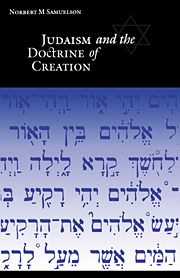Book contents
- Frontmatter
- Contents
- Preface
- Introduction
- PART 1 THE MODERN DOGMA OF CREATION
- Chapter 1 Creation in Franz Rosenzweig's Star of Redemption
- Chapter 2 A critique of Rosenzweig's doctrine: is it Jewish and is it believable?
- PART 2 A JEWISH VIEW OF CREATION
- PART 3 THE FOUNDATIONS FOR THE JEWISH VIEW OF CREATION
- PART 4 A BELIEVABLE VIEW OF CREATION
- Notes
- Select bibliography
- Indices
Chapter 2 - A critique of Rosenzweig's doctrine: is it Jewish and is it believable?
Published online by Cambridge University Press: 08 January 2010
- Frontmatter
- Contents
- Preface
- Introduction
- PART 1 THE MODERN DOGMA OF CREATION
- Chapter 1 Creation in Franz Rosenzweig's Star of Redemption
- Chapter 2 A critique of Rosenzweig's doctrine: is it Jewish and is it believable?
- PART 2 A JEWISH VIEW OF CREATION
- PART 3 THE FOUNDATIONS FOR THE JEWISH VIEW OF CREATION
- PART 4 A BELIEVABLE VIEW OF CREATION
- Notes
- Select bibliography
- Indices
Summary
The discussion of the concept of creation out of the sources of Judaism began with modern Jewish philosophy. In this instance only two notable Jewish thinkers address the question with any degree of depth, Nachman Krochmal and Franz Rosenzweig. Except for the fact that the latter seems to have been influenced by the former, for our purposes there is no connection worth mentioning between them. In terms of development and depth of analysis, both with respect to philosophy and theology, there is no comparison. Clearly Rosenzweig's statement is the more important of the two. Hence, the descriptive part of the first section of this study (viz., creation in modern Jewish philosophy) focused almost exclusively on what Rosenzweig wrote. That discussion broke down into two parts – Rosenzweig's philosophy and Rosenzweig's theology.
The two parts of Rosenzweig's discussion of creation differ radically in their mode of presentation. The first is a philosophic analysis built upon his understanding of the history of philosophy. The second is a linguistic commentary on the Hebrew scriptures. However, the conception of creation that emerges through the two disciplines is a single view that in itself shows why Rosenzweig discussed the question in the way that he did. Creation is a philosophic/scientific concept that points to the insufficiency of both philosophy and theology to understand the origin of the universe. Its conception begins as a philosophical question but its solution lies beyond the scope of purely logical empirical thinking. Creation must be grasped as something that is revealed through the word of God as recorded in scripture. Hence, while creation begins as a philosophic doctrine, it ends as a theological dogma.
- Type
- Chapter
- Information
- Judaism and the Doctrine of Creation , pp. 68 - 74Publisher: Cambridge University PressPrint publication year: 1994



